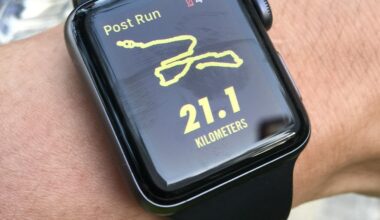Should You Avoid Certain Foods Before Exercising?
When considering the best pre-workout nutrition choices, many individuals believe in several myths that can mislead their performance. One common myth suggests that all carbohydrates should be avoided before exercising. This idea stems from the concern that carbs can cause sluggishness. However, avoiding carbs entirely is detrimental. Carbohydrates fuel your muscles, providing energy for intense workouts. Instead of avoiding all carbs, prioritize complex carbohydrates such as whole grains and legumes, which digest slowly to offer sustained energy. In contrast, simple carbs can be beneficial immediately before a workout for quick energy release. Additionally, it’s crucial to understand the role of hydration. Many athletes mistakenly believe that they can rely solely on water consumption at the moment of their exercise. Instead, consistent hydration throughout the day is essential. Dehydration can lead to fatigue and decreased performance. Aim for a balanced diet leading up to your workouts, including proteins for muscle repair and fats for long-term energy. Tailoring your approach can enhance your exercise experience significantly and debunk any food-related myths that you may have previously believed.
Another prevalent myth about pre-workout nutrition involves the perception that eating high-fat foods before exercising is counterproductive. While it’s true that high-fat meals take longer to digest, this doesn’t mean that all fats should be avoided. Healthy fats, like avocados, nuts, and olive oil, provide an energy source that can benefit longer workouts. However, it’s crucial to time your consumption correctly. Consuming a high-fat meal right before a workout can lead to discomfort and sluggishness due to slower digestion. Instead, you should consider eating a small amount of healthy fats a couple of hours before exercising to prevent any discomfort. Moreover, the timing and type of protein consumed before workouts are often misunderstood. Many believe that consuming protein solely in the post-workout period is enough for muscle recovery. However, having a balanced protein source before your workout can enhance muscle performance and recovery. Foods like yogurt, eggs, or protein shakes deliver essential amino acids. This practice can aid in muscle repair during and post-exercise. Consider incorporating a balanced meal that contains protein, carbs, and fats for optimal energy and recovery results.
Debunking Sugar Myths
Another major misconception about pre-workout nutrition revolves around sugar intake. Some believe that consuming sugar before exercising will lead to energy crashes. While it’s true that sugar can cause rapid spikes in blood sugar levels, it also offers a quick source of energy required for high-intensity workouts. However, moderation is key. Consuming excess added sugars, especially from processed snacks and candies, can result in negative health effects and should be avoided in favor of natural sugars found in fruits. One common practice among fitness enthusiasts includes having a banana or an apple pre-workout. These fruits provide not only sugars for instant energy but also valuable fiber and vitamins that support overall well-being. Pairing these fruits with a source of protein can help sustain energy levels throughout the workout. It’s essential to differentiate between refined sugars and natural sugars when planning pre-workout nutrition. Balanced and nutritious choices will ultimately lead to improved performance and debunk misconceptions regarding sugar in pre-workout meals.
Some individuals worry excessively about food intake before workouts, incorrectly believing that exercising on an empty stomach is superior for burning fat. While modest amounts of fasting can have benefits, consuming a light meal before exercising can enhance performance and make workouts more effective. Exercising without proper nutrition may lead to fatigue and diminished overall performance levels. Another common myth associated with pre-workout nutrition is the idea that certain foods can make you feel ‘heavy’ during workouts. It is not the foods themselves but rather the quantities consumed that can lead to discomfort. Ideally, you should consume easily digestible foods such as oatmeal, smoothies, or yogurt about an hour before exercising. If you’re looking for a low-calorie option, consider celery sticks with peanut butter, which provides both hydration and energy. In contrast, foods that are high in fiber, while healthy, might cause unnecessary bloating right before your workout. Overall, understanding portion sizes and pre-workout timing can alleviate these concerns while enabling you to train more effectively.
The Role of Supplements in Pre-Workout Nutrition
Many believe that consuming supplements before workouts is necessary to enhance performance, leading to myths about pre-workout nutrition. While some supplements can indeed yield benefits, optimal results often stem from whole foods rather than synthetic sources. For instance, caffeine is a popular supplement that many athletes swear by for improving endurance and focus. However, adequate caffeine levels can also be achieved through coffee or tea. Whole food options can provide a range of vitamins and minerals alongside energy. Before reaching for the latest supplement craze, consider nutritional sources that support your performance naturally. A balanced meal containing simple carbohydrates and protein can also serve as a solid pre-workout option. Experimenting with different options can lead to discovering what works best for you personally. While some people may thrive on supplements, others may find they perform better without them. It’s crucial to listen to your body and adapt accordingly. Ultimately, understanding that food choices and balanced diets play an immensely important role in enhancing performance rather than solely relying on supplements is essential.
Some gym-goers argue against consuming dairy before workouts, fearing it may lead to digestive issues. While this belief is rooted in genuine experiences, it doesn’t apply universally. Dairy products offer strong protein sources that can aid muscle repair and recovery. For those who handle dairy well, incorporating Greek yogurt or cottage cheese into their pre-workout meals can provide ample energy and protein while avoiding any discomfort. In fact, pairing these with fruits or whole grain options can create an optimal pre-workout meal. Those sensitive to lactose should consider lactose-free alternatives or non-dairy options like almond milk or plant-based yogurt, ensuring their energy needs are met without adverse side effects. Abstaining from dairy altogether may limit protein intake. It’s essential to assess individual tolerance levels and make dietary choices accordingly. Consider the significance of diverse nutrient sources in your diet that promote better energy levels pre-exercise. Remember, what’s effective for one person may not work for another, so keep testing different combinations until you find your perfect fit for workout nutrition.
The Importance of Personalized Nutrition
In conclusion, the world of pre-workout nutrition is often filled with misconceptions that can hinder optimal performance. Understanding individual dietary needs is essential for achieving desired fitness results. Myths regarding food choices abound, but by focusing on balance and timing, you can maximize your workout effectiveness. Rather than adhering strictly to the idea that certain foods are off-limits, customize your nutrition to fit your unique needs and preferences. Consider how your body reacts to various foods and types of fuel throughout your training. Use trial and error to discover the combination of complex carbohydrates, protein, and healthy fats that best support your goals. Additionally, ensure you maintain hydration levels consistently before and during workouts, promoting overall endurance. If confusion surrounding food restrictions arises, consult with a nutritionist who can provide tailored advice. Ultimately, dispelling myths surrounding pre-workout nutrition empowers you to make informed choices. Adopting a flexible mindset towards food can lead to greater enjoyment and fulfillment in your fitness journey. Empower yourself with knowledge and approach workouts ready to perform at your highest potential!


